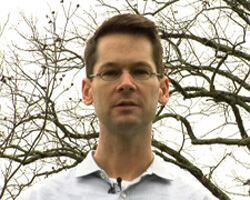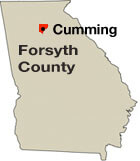Overview
 |
| Patrick Phillips, 2009. |
Patrick Phillips grew up in Forsyth County, Georgia, at the northern edge of the Atlanta metropolitan region. Recorded near the town of Cumming and along Lake Lanier, the poems presented here delve into family, place, conflict, and time's effects. Phillips finds mystery and ambivalence in childhood's physical and emotional landscapes, scratches the idyllic patina of family lore, and moves between the surfaces and depths of the natural world.
"Watching the Surface for a Sign" is part of the Poets in Place series, a Research Collaboration in the Humanities initiative funded through Emory University’s Presidential Woodruff Fund, in collaboration with the Office of the Provost. Series producers are Natasha Trethewey and Allen Tullos.
Readings
About Patrick Phillips
Patrick Phillips won the 2005 Kate Tufts Discovery Prize for his first book, Chattahoochee, and his second, Boy, was published by the University of Georgia Press in 2008. His poems have appeared in many magazines, including Poetry, Ploughshares, and The American Poetry Review, and his honors include fellowships from the National Endowment for the Arts, the US Fulbright Commission, and the Bread Loaf Writers' Conference. Phillips lives in Brooklyn and teaches writing and literature at Drew University.
Interview with Natasha Trethewey
In this interview, conducted during the 2009 Association of Writers and Writing Programs (AWP) Conference in Chicago, Illinois, Patrick Phillips talks with Natasha Trethewey about his poetry. Subjects of conversation include Phillips' use of autobiography and family history, investigation of the natural world, and the legacy of white supremacy in Forsyth County.
Part 2: Phillips discusses “Brass Knuckles,” ambivalences of place and family, and the autobiographical impulse in poetry
Part 3: Phillips discusses the history of Forsyth County, outlining how racism has shaped the image of community
Part 4: Phillips discusses poetry, social change, and ambiguity; “Baptism and the role of the church; and disappearing places
Recommended Resources
Map

Phillips, Patrick. Boy. Athens: University of Georgia Press, 2008.
———. em>Chattahoochee. Fayetteville: University of Arkansas Press, 2004.
Web
American Life in Poetry, introduced by Ted Kooser. Text of "Matinee."
http://www.americanlifeinpoetry.org/columns/124.html.
The American Poetry Review. Text of "Revelation."
https://www.aprweb.org/poems/revelation4.
Born Magazine. Text of "Elegy Ending in a Dream," with digital artwork by Paul Corrigan.
http://www.bornmagazine.org/projects/elegy/.
Harvard Review. Text of "In the Beginning."
http://hcl.harvard.edu/harvardreview/issues/34/phillips.html.
Ploughshares. Text of "Ghazal."
http://www.pshares.org/issues/article.cfm?prmarticleID=4764.
storySouth. An interview with Billy Reynolds and text of five poems.
http://www.storysouth.com/poetry_features/2006/08/phillips_poems.html.
Virginia Quarterly Review. Text of nine poems.
http://www.vqronline.org/author/5502/patrick-phillips/.
The Writers' Almanac with Garrison Keillor. Text and audio of seven poems.
http://writersalmanac.publicradio.org/author.php?auth_id=2159.